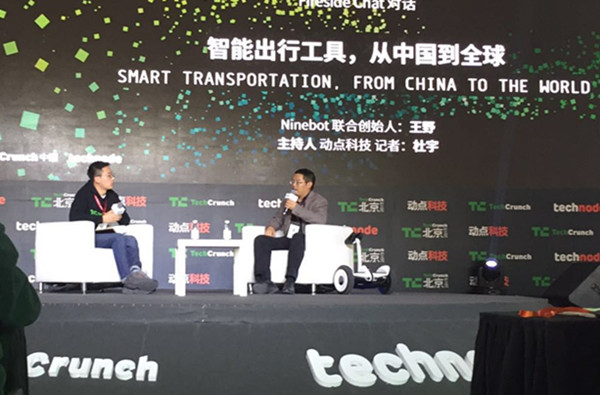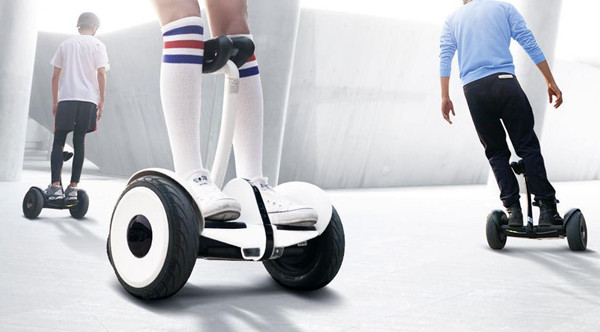
Ninebot co-founder Wang Ye (R) speaks at a Tech Crunch panel on smart transportation in Beijing, Nov. 2, 2015. (Photo provided to ECNS)
(ECNS) -- Seven months after acquiring Segway, the leader in small electric vehicles for more than a decade, the Chinese startup Ninebot says it's a win-win and that Segway was "happy to be acquired by us."
Co-founder Wang Ye shared the reasons for the acquisition and his visions for the company during an exclusive interview Monday with Ecns.cn at the Tech Crunch Beijing summit.
"Fifteen years ago Segway wanted everyone on the road to have a Segway, but it failed due to its hefty prices and the fact that its product design might be unfriendly to after-sale services," Wang said. "We have good service and affordable prices, and we want to finish what they failed."
The four-year-old startup acquired its U.S. rival in April, after scoring $80 million in funding from investors that included phone-maker Xiaomi, Sequoia Capital, Shunwei Foundation and West Summit Capital.
Wang said Ninebot mostly values Segway for its brand, patents and global distribution system, adding that the negotiation lasted for over a year.
"We respect them very much because they're the pioneers. They're still an American icon like Harley Davidson motorcycles."
Although it's widely known in the overseas market and still used by security guards and at tourist spots, Segway failed to live up to the hype at its launch in 2001. High-profile accidents involving George W. Bush and Segway's UK investor Jimi Heselden raised safety concerns.
The company had been sold twice before being acquired by Ninebot – first to Heselden in 2009, and to Summit Strategic Investments in 2013.
"When we acquired Segway, the original founders had already left many years ago. The company had basically stopped innovating and producing new products. We want to carry on what they've been doing," Wang said.
Last year, Ninebot sold over 30,000 units in the overseas market, mostly in France, Germany and South Korea. But it only sold about 10,000 units in China's price-sensitive market, leading the team to a partnership with Xiaomi, which is known for controlling costs.

Its two-wheeled self-balancing scooter, the Ninebot mini, priced at 1,999 yuan ($320) or 1/20 of the price of a Segway, snapped up an "astonishing" 400,000 pre-orders from October 19 to November 2, when it was officially unveiled on Xiaomi's platform.
But Wang says the low prices don't mean that safety has been compromised.
"For overseas markets we have to pay for distribution channels, shipping, taxes, warranties and services to customers. That money is saved in China with Xiaomi's direct distribution system. We also reduced some of its features, such as the maximum speed, to bring down costs."
Wang, with a master's degree in robotic engineering from Beijing University of Aeronautics and Astronautics, said the future of personal transportation should be smart enough to move along with the movements of the human body.
"Your hands should be free, and you can even hold a cup of coffee when you ride," Wang said, adding that relying on hurdles too much may pose safety risks. For example, when the scooter turns over, it may prevent riders from quickly getting off the vehicle.
The Ninebot mini, which has no handles, uses foot and steering censors to control direction and speed. If a person leans forward, the vehicle goes forward. When the person's left knee leans right, the vehicle goes to the right. The vehicle's maximum speed is 16 kilometers per hour and the battery runs for up to 22 kilometers on a full charge. It's portable at 12.8 kilograms (28 pounds).
However, Wang said the company's biggest innovation will be a multitasking robot, which is likely to be released at the CES 2016 next January.


















































